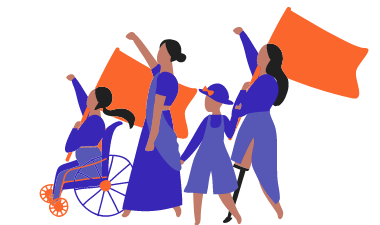
Author: Ayesha Masud & TL McMinn
Disability is a broad term used to encompass physical, mental, learning, and a diversity of other disabilities. For people with disabilities, their disability is not the issue. However, some workplaces are designed in a way that can make people with disabilities feel excluded both professionally and personally. This is because, despite the commonality of disabilities, workplaces often only cater to people without disabilities. When disabilities are brought up, it is usually when talking about accommodations an individual may require. Accommodations can present as extra time during interviews, translation services, specific equipment like a standing desk, and more. They are usually changes to the work environment made specifically due to individual requests, covered under an accommodation policy. While at times helpful, accommodation alone is insufficient as it implies that people with disabilities are extras who require add-ons to work within “normal” workspaces. In reality, having a disability is not inherently problematic and does not impact a worker’s productivity or success. In order to allow people with disabilities to succeed, we have to go beyond accommodation to inclusion.
At Lunaria, we focus on inclusion that goes beyond policy. We believe DEI includes, but doesn’t end, with policy. We outlined a few ways you can grow inclusion beyond accommodation.
The first is a change in perspective
Living without a disability, when we look at the world we are unfettered and rarely affected by barriers that exist for people with disabilities. This can include anything from physical accommodations, to the mental labor imposed on people with mental health issues resulting from normative work timelines and pressures. Because we may not be affected by these pressures, we might not feel pushed or drawn to think outside the box and create inclusionary practices that allow us to build a workplace culture that truly supports the disabled community.
The practice of ableism is the assumption that those without disabilities are superior to those with disabilities, and thus there is no reason to create an environment that caters to differing needs. The world we navigate is ableist, most spaces were not built with disability in mind, this includes our workspaces. When we talk about going “beyond inclusion,” we are referencing the need to enhance one’s perspective, not because someone with a disability requires it, but because it ensures that people, regardless of disability, feel included. The key to this understanding is to identify and address the inherent ableist assumptions underlying, not just within our workplaces, but within ourselves as well.
A change in perspective is crucial to this process. In order to be inclusive, you first need to understand exactly how much you do not know.
The second is education
Once you’ve started to shift your perspective by acknowledging the gaps in your knowledge, you can access additional education to set you up for success. This can look like reaching out to disability advocates (like Liberty Co founded by the wonderful Wanda Deschamps or DAWN which focuses on Women with DisAbilities), engaging in training to build knowledge within a group, and so much more. The aim is to locate expert advice that can help you to not only make your space physically (being able to access all spaces within the office, including files, washrooms, printers, etc.) accessible, but inclusively accessible (taking care in the words used, in signage and publications, allowing flexibility in start times for those with chronic health conditions) as well. This involves more than moving desks around, it requires a shift in perspective, a change in how we operate and think about ourselves and others. An easy example: Do you hold “stand up” meetings every day? Regardless of whether or not anyone at your organization uses any type of mobility device, the term overall is ableist because not all individuals can “stand up.”
Lunaria can be a support at this step. Our advisors are well-equipped to provide metrics and demographics on your company and its educational capacity. We then support further learning with uniquely adapted educational units so you can achieve your DEI goals.
The third is action
After gathering all your knowledge and advancing your educational capacity, the next step is to implement change. You are planning at this stage for inclusion, and not simply accommodation. For example, you have identified exclusionary practices for people with disabilities at all levels of hiring within your company and you are looking at system level change to remove these barriers. Integral to this step is feedback – change must be iterative and provide opportunities for people with disabilities to evaluate the changes and provide opportunities for improvement.
The fourth is sustainability
This means looking into the future to create a culture of inclusion that involves everyone within the organization feeling comfortable questioning and challenging the norm. This ensures that the burden of reforming inequitable systems does not rest with the most marginalized. This can look like long-term feedback mechanisms, continuous educational opportunities, annual audits, and other avenues to maintain and advance DEI progress in the area of disability inclusion.
While these are a few avenues to get started, we know the journey to going beyond inclusion and tackling the inherent ableism is a long process. Lunaria is here to support you by meeting you where you are at and working with you from there. We encourage you to take advantage of our free consultation sessions with one of our advisors and look forward to supporting your DEI work.

